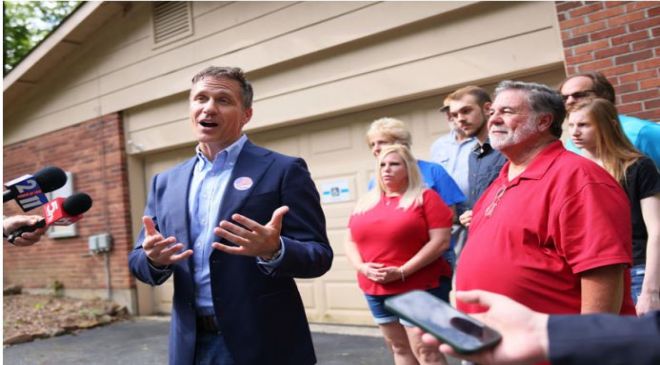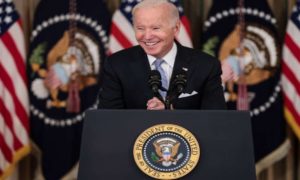With two words, Donald Trump launched a wild Monday scramble that Republican leaders had hoped to avoid: “sometime today!” the former president wrote on Truth Social at 10:31 a.m., declaring his plans endorse in Missouri’s U.S. Senate primary.
Trump had not yet decided which candidate to back when he published those words, according to interviews with numerous officials familiar with the chaos that ensued. So began an eight-hour deadline to win over Trump’s favor before primary day — a decision that in the mind of some Republicans could have undermined GOP hopes for taking control of the Senate this fall.
Trump began the day leaning toward an endorsement of former Missouri governor Eric Greitens, according to people familiar with his thinking, batting away the concerns of some senators, advisers and donors who had spent weeks warning him it could be a catastrophic mistake.
Soon Trump’s phone was ringing with Sen. Rick Scott (R-Fla.), the head of the National Republican Senatorial Committee, offering polling in an attempt to back him down. Republican National Committee Chairwoman Ronna McDaniel showed up for a previously scheduled meeting in his office to make the same case, facing off against his future daughter-in-law, Kimberly Guilfoyle, who had been lobbying Trump on an endorsement all weekend for Greitens. Dozens more officials, donors and politicians, including Sen. Josh Hawley (R-Mo.), weighed in by phone against Greitens. Two prominent donors close to Trump, Bernie Marcus and Dick Uihlein, were major supporters of Greitens.
Ultimately, Trump found an off-ramp by offering his “endorsement” to no one in particular, following the suggestion of a close adviser and taking advantage of the fact that two of the leading candidates in the race — Greitens and Missouri attorney general Eric Schmitt — had the same first name. Trump immediately embraced the idea, after asking if their first names were spelled the same and taking “more than 50 calls and meetings” about it, in the telling of one adviser.
“I trust the Great People of Missouri, on this one, to make up their own minds,” he wrote at 6:13 p.m., ending the suspense. “I am therefore proud to announce that ERIC has my Complete and Total Endorsement!”
By the time the Missouri Senate primary race was called Tuesday night for Schmitt, Trump could perhaps make a claim of partial victory — but only after causing 36 hours of Republican chaos, along with widespread jeering from Democrats.
Eighteen months after leaving the White House, Trump was right where he liked to be — at the center of the action with the attention of the entire political universe, though this time it was not at all clear if he held a winning position.
The episode reveals a former president surrounded by advisers and hangers-on who often have dueling loyalties between him and other candidates they work for, while also illustrating Trump’s uncertainty when faced with a decision that risks showing him as backing a losing cause.
This account of Trump’s last-ditch attempt to intervene, however tentatively, in the Missouri Senate race is based on interviews with 14 advisers, lawmakers and other close allies, many of whom spoke on the condition of anonymity to describe behind-the scenes maneuvering.
Greitens had resigned from his prior office after allegations that he blindfolded, bound and photographed his mistress. He was later accused by his ex-wife of knocking her down and physically abusing their children. Despite his denials of the claims against him, he was widely seen by party leaders as a liability for the party in a general election.
Schmitt, by contrast, had failed to fully embrace the baseless 2020 election denials and radical posturing of Trump’s “Make America Great Again” movement, while raising concerns from Trump that he would work to support Senate Minority Leader Mitch McConnell (R-Ky.), a Trump foe, even though Schmitt had tried to distance himself.
Several Trump advisers ultimately praised the “ERIC” endorsements as a lighthearted troll of anyone who had expected a more serious result, especially those in the press. One Trump adviser explained Trump was “having fun, creating chaos.”

“It was undoubtedly the most Trump-ian move possible,” said Andy Surabian, a former White House official who works with Donald Trump Jr. “Not only was it a politically sly move that basically made everyone happy in the end, but it was a laugh-out-loud funny troll on the media, who had been waiting on pins and needles for him to make his endorsement there.”
But for many of the people involved in the infighting, the battle over Trump’s decision was anything but fun and showed weakness and uncertainty. “Bananas,” was the description of one operative involved. Once again, top Republican officials and Trump advisers had succeeded in partially stopping him from actions that they believed would harm both him and the party.
“It was,” said another Trump adviser, “a bit of an averted disaster.”
The immediate result was even more confusion in Missouri. Schmitt immediately declared he had won the nod. Greitens simultaneously argued the endorsement was for him, pointing out that another part of Trump’s missive that had said Missouri needed “a MAGA Champion and True Warrior.”
“I’m a Navy SEAL. Eric Schmitt, he’s a career politician,” Greitens reasoned in a video to supporters he recorded in an airplane hangar in St. Louis between events.
Rep. Vicky Hartzler (R-Mo.), a third candidate in the race, who had faded in polling after Trump announced she would not be getting his endorsement, divined a different meaning.
“Congrats to Eric McElroy. He’s having a big night,” she said in a statement, referring to another little-know candidate with the coveted first name also on the ballot, identified by the St. Louis Post-Dispatch as a comedian from Tunas, Mo.
Rep. Billy Long (R-Mo.), the auctioneer politician running the same race, would not be outdone. He claimed falsely on Twitter that the endorsement was for him, because his name appeared between Schmitt and Greitens on the ballot.
“I just ran #Trump’s #MOSen statement through my Covfefe filter and what he meant to say was ‘Don’t Vote Wrong — Vote Long and Don’t Be Silly — Vote For Billy,’” Long joked, referring to a long-ago errant tweet from Trump during his presidency.
Republicans in Missouri read the non-endorsement as a likely wash, denying Greitens the boost he could have received had Trump settled on a last name as well.
“With it coming so late, after 5 p.m. on the night before, and voters being confused, it probably helps Eric Schmitt win,” said James Harris, an unaffiliated Republican in the race, who noted the damage that recent attacks on Greitens have inflicted. “You have had five weeks of statewide broadcast, texting, mail, talking about the monster that Eric Greitens is.”
Before the start of the week, Trump had endorsed in each of the major statewide races this election cycle. He was widely seen as wanting to weigh in on the Missouri race. At the same time, he knew the concerns about Greitens, a repeat visitor to Mar-a-Lago.
“They say he’s a wild one,” Trump had repeatedly told friends and advisers.
Of all the brutal Republican primaries this cycle, Missouri’s Senate contest had been one of the fiercest, with $35 million in spending in the Republican primary, including more than $8 million in attacks on Greitens by outside groups, most of it coming in the final months, according to the Center for Responsive Politics.
Trump’s Monday afternoon at Bedminster, according to people with knowledge of what inspired, was “insane even by the usual standards,” in the words of one longtime adviser.
Key figures included senators, donors, top operatives and the leader of the Republican Party.

During a meeting there on Monday, McDaniel discussed polling with Trump that suggested Greitens was likely to lose, as his numbers had come down over the summer, and argued he should stay out of the race. Sen. Lindsey O. Graham (R-S.C.) had also previously made clear to Trump that he opposed Greitens, according to a person involved in the conversations. Others lobbying against the endorsement included Pam Bondi, a longtime Trump adviser. Some of the advisers argued that Greitens was likely to lose the seat if he became the nominee, and then Trump would be blamed for Republicans losing the Senate.
Trump had information on his desk that was positive about Schmitt, including a range of nice things Schmitt had said about him, and polling that showed Schmitt was going to win, three people with knowledge of the matter said.
By afternoon, Trump called Sen. Josh Hawley (R-Mo.), according to people familiar with the call, who described a poll that showed Greitens behind. Soon, Trump summoned Guilfoyle, Greitens biggest backer, into the room. She grew animated, aggressively arguing for Trump to back Greitens.
Guilfoyle said that by not endorsing Greitens, Trump was going against his own base, said people familiar with the conversation. Boris Epshteyn, an adviser to both Trump and the Greitens campaign, also weighed in on behalf of Greitens. He has recently taken on a larger role in Trump’s orbit, sometimes talking to the former president multiple times a day. During at least one point in the conversation, according to people briefed on it, Trump grew annoyed that Guilfoyle was pushing him so relentlessly about the endorsement.
The Greitens team had argued that Schmitt was close to the McConnell wing of the party, despite Schmitt having said that he did not “endorse” McConnell in his continued effort to stay in leadership in the Senate. They pointed out that Karl Rove, another sometime Trump adversary, was opposing Greitens and that Jeff Roe, who had run races against multiple Trump-endorsed Senate candidates, was working for Schmitt.
One person with direct knowledge of the deliberations said Trump had a desire to endorse Greitens partially to hurt Rove, who wrote an op-ed in the Wall Street Journal this weekend criticizing his donations strategy that Trump did not like — and who has repeatedly angered Trump with criticism of him.
Many of his advisers just cautioned him to stay out of the race totally, saying there was no benefit from jumping in.
“There is no reason to get involved in this,” said one Trump adviser.
Over the previous week, according to a Trump ally, the former president had at times been very close to endorsing Schmitt, with former Florida Attorney General Pam Bondi and former acting U.S. Attorney General Matt Whitaker, who had previously worked with Roe, leading the charge. But Greitens’s supporters had pulled him back from the brink.
“Normally he’s inclined to do the crazy thing and endorse Greitens and people are trying to talk him out of that. This time it was the opposite; he was going to fall back and endorse Schmitt and there was a huge campaign to stop the endorsement of Schmitt,” said another Trump ally.
By Sunday night, it appeared Greitens was making headway again. Trump circulated a Breitbart news article suggesting that a poll paid for by Schmitt was unfairly undercounting Trump’s support in a hypothetical 2024 Republican presidential primary in the state. By the following morning, Schmitt’s team heard from a prominent donor warning that an endorsement of Greitens was on the table.
But they were not able to overcome Trump’s doubts.
Late in the afternoon, Trump was connected to Robert Cahaly, a pollster at the Trafalgar Group, who has a habit of releasing surveys right before elections. Trafalgar had been polling in Missouri through the weekend, only leaving the field Monday afternoon, just hours before talking to Trump.
His fresh results, which would be released publicly shortly after the Trump conversation, showed Schmitt with a clear lead in the race, suggesting that an endorsement of Greitens this late in the campaign would be unlikely to change the results. The arguments from McDaniel and Scott suddenly had new data.
“I get calls from donors and elected officials and candidates and former candidates all the time and I pretty much talk to anybody,” Trafalgar said. “I told him what the poll I had said.”
After Trump decided he did not have to decide between the two men, the former president called both Schmitt and Greitens to give them what he cast as good news.
His message to Greitens was supportive.
“I hope you do well. I know you are with me. I know you have been fighting for me,” according to a former Trump adviser, paraphrasing what had been said on the call.























